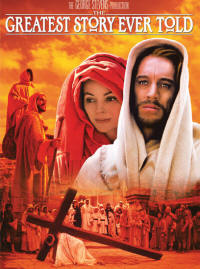Making movies. Enjoying movies. Remembering movies.
|
By
William Kallay

Back in
November of 2004, the Academy (the folks who give out Oscars every year)
held a special once-in-a-lifetime screening of "The Greatest Story Ever
Told" at the Samuel Goldwyn Theatre in Beverly Hills. Why did it take me so
long to write this article? You could say I'm still in shock at how
this film has an effect on an audience.
I’m not one to pass up the opportunity to see one of those widescreen
spectacles from the 1960s. You know what I’m talking about. Mix epic pomp
and circumstance, with well-crafted monologues, legions of extras dressed in
costume, and a stirring score, and you’ve got yourself classics like the oft
mentioned “Lawrence Of Arabia” and “Ben-Hur.” I love this stuff.
With "The Greatest Story Ever Told," however, I must admit that I had some
trepidation about seeing a recent, and I might add, very rare screening of
George Stevens’ 1965 epic. I had read in various books about film that it
was a major critical and financial flop for not only Stevens, but for United
Artists, the company that financed and distributed the film. I read and
heard it was slow—very slow.
I hymned and hawed: should I pay $5.00 to see it? It might be the only time
in my life to see this film. Perhaps almost 40 years of the passage of time
might be kind to it. Perhaps it could find a new, modern and appreciative
audience today. Perhaps I could learn to love this film.
The Academy is known for excellence in presentation at the Samuel Goldwyn.
Their staff, put together an exceptional show, which no doubt took a great
deal of time and preparation. Their attention to detail certainly showed on
screen. The staff went through great pains to find the correct lenses to
show the 70mm print in its original, and v-e-r-y w-i-d-e, Ultra Panavision
aspect ratio. So I feel rather guilty to criticize this film. After all,
some of the cast was there, including Martin Landau. George Stevens’ wife
was in attendance, too. The evening’s screening was an event in itself.
To say I enjoyed moments in this film would be stretching the truth. To say
I liked it just a little bit would be a lie. But to say I loved this film
would be heresy. “The Greatest Story Ever Told,” despite the good intentions
of George Stevens and his cast & crew of putting out a good film, clearly
missed the mark with this film. Even if this film was shot on 130mm film and
was cut down to a half-hour time limit, it would still be “The Dullest Story
Ever Told.”
Sitting in my comfy Academy chair, I tried to give this epic a chance. The
music by Alfred Newman is utterly wonderful and well-recorded. It’s one of
those rare soundtracks that can stand out on its own (it’s been recently
released on CD by Varese Sarabande.) And the cinematography by Loyal Griggs
& William C. Mellor is exceptional. But the movie waddled along. And it
continued to waddle along, and then some.
There are long passages of Jesus Christ (played by Max Von Sydow) walking
with his disciples through the Utah desert (where it was filmed). He
performs a lot of sermons in this film. And then, He performs more. To add
another sermon to injury is Charlton Heston’s portrayal of John the Baptist.
He bellows out that the Son Of God is here on Earth. At one point, I was
expecting a pulpit to rise from the water where Heston was standing. His
acting is so over-the-top in this film, that it’s pretty comical in such a
“serious” epic as this. “Get your stinking hands off me, you damned dirty
Roman!”
Before the film was even near the intermission, I looked around the
audience. A lady next to me was completely out, snoring. Looking to my
right, at least a dozen more people were in the Land of Snooze. I have never
in my lifetime seen this happen to an audience during a film. Never. I’ve
seen bombs before, and I’ve walked out on movies that weren’t good, but this
film had an effect so profound on the audience, I chuckled. Indeed, George
Stevens had noble intentions with this film, but his direction was so heavy,
it crushed anyone watching it that night.
I’ve heard that this film affected audiences the same way back in 1965. I
thought that maybe time would be kind to the film. But it wasn’t. The film
is simply a bore. I didn’t love it, as it turned out. I walked out before
the intermission and never came back. I figured security might have gone
down each row of seats to shake awake any sleepy heads left in the
auditorium.
